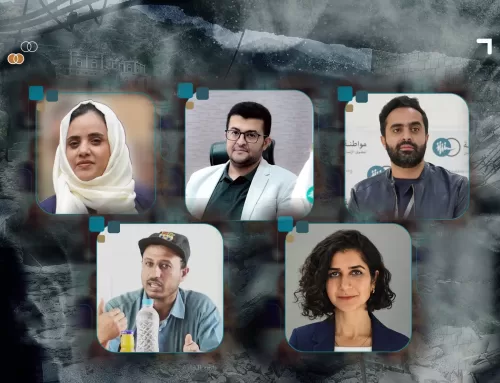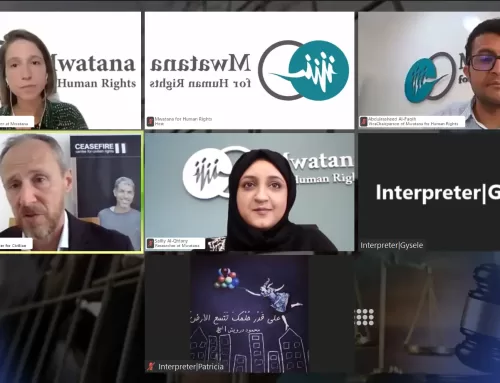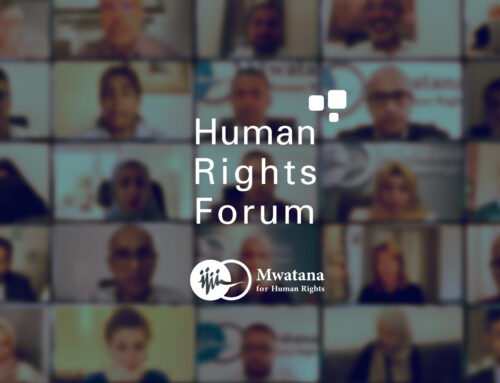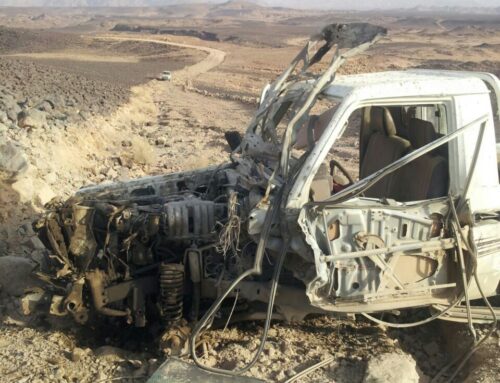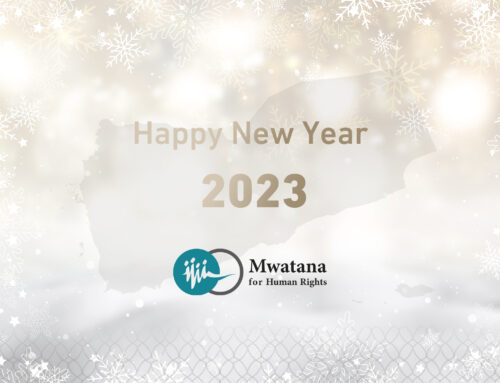Sanaa – January 25, 2022
Radhya Al-Mutawakel, the chairperson of Mwatana for Human Rights briefed the UN Security Council, chaired by Norway this month, in an open debate entitled “Wars in Cities: protection of civilians in urban settings”.
Additionally, the UN Secretary General Antonio Guterres and the President of the International Committee of the Red Cross (ICRC) Peter Maurer briefed the Council in the same open debate.
Full text of briefing delivered by the Chairperson of Mwatana for Human Rights Radhya Al-Mutawakel before the UN Security Council in the open debate “Wars in Cities: protection of civilians in urban settings”
January 25, 2022
Mr. President, distinguished representatives of Member States, ladies and gentlemen,
Thank you for allowing voices from civil society to reach this Council.
I also want to thank the UN Secretary General and the President of the International Committee of the Red Cross (ICRC) for their briefings.
I delivered a briefing to this Council before, on May 30, 2017, during a special session on Yemen. During the period between my first briefing and my briefing today, the combatants in Yemen have claimed thousands more civilian lives, destroyed more civilian facilities and infrastructure, and squandered many opportunities to stop the bloodshed.
I am speaking to you this time from my office in Yemen, where the blood-shedding is still ongoing recklessly. In less than a month, Mwatana documented seven airstrikes by the Saudi/UAE-led coalition on civilians and civilian objects, that killed at least 107 civilians and injured at least 106 others. The bloodiest airstrike was on a detention center in Saada where at least 82 detainees were killed and at least 163 others injured, including those who were injured due to live munitions fired by Ansar Allah (Houthis).
Moreover, at the same period, Mwatana documented 10 incidents of ground attacks, mine explosions, and drones use committed by Ansar Allah (Houthis) which killed at least nine civilians and injured at least 10 others.
civilians continue to suffer and all warring parties; the Iranian-backed Ansar Allah armed group (Houthis), the Saudi/UAE -led coalition, the internationally recognized Yemeni government, the UAE-backed Southern Transitional Council and Joint Forces committed violations of international humanitarian and human rights law.
Many civilians in Yemen have been made victims by the use of various explosive weapons in populated areas, from weapons such as indiscriminate projectiles, mines, and ballistic missiles, to intelligent weapons such as laser-guided bombs and drones.
All aspects of life were devastated, including homes, schools, hospitals, wedding and funeral halls, farms, factories, and cultural property. Each of these notables has a meaning in the lives of Yemenis.
Since the outbreak of the conflict in Yemen in 2014, Mwatana for Human Rights has documented at least 800 air strikes, more than 700 ground attacks, and more than 300 incidents of mine explosions. Mwatana has also documented explosions caused by explosive objects and the use of drones and ballistic missiles.
More than 3,000 civilians were killed in these attacks and more than 4,000 civilians were wounded. Civilian objects were damaged and destroyed. In “The Starvation Makers” report, Mwatana documented how warring parties used explosive weapons, such as air strikes and mines as a tool to starve civilians.
In a large number of these attacks, Mwatana identified no military target. In others, the documented civilian harm is beyond any apparent military benefit. These attacks happened because the parties to the conflict trusted impunity.
I personally visited, as dozens of Mwatana team have, different parts of Yemen, where we saw the scattered remains of innocent men, women, and children who did not know why they were killed, we saw how whole families slept peacefully at night, and when the day came, the number of survivors was zero.
We observed the poor villages that never knew any of the modern technology—no smart phones, no computers, —but were targeted by the latest bombs and projectiles dropped by the latest aircraft manufactured in the richest and most urbanized countries. The same villages were not spared from the most backward weapons.
We also saw the main Yemeni cities with the largest populations suffer from this war. These cities have been at the center of military operations, targeted over and over again.
Despite all the griefs that Yemeni women and men have experienced, the Security Council and the international community still have the capacity to make positive change. Beside pushing for a sustainable peace, there are a number of decisions that can be made that will better protect civilians. These decisions include:
- Put pressure on the warring parties to stop the use of explosive weapons in populated areas.
- End arms sales, especially to countries that have a track record of violating human rights law and international humanitarian law. Arms exporting countries have a responsibility on their shoulders, and it is unreasonable to turn a blind eye to their role.
- Strive for a new declaration on preventing the use of explosive weapons in populated areas, especially those that cause mass impact and incur heavy costs for civilians.
- Strengthen accountability for international crimes rather than upholding impunity. It is not sufficient to name and shame the warring parties and their behavior. This Council should at long last refer Yemen’s situation to the International Criminal Court.
It is shameful that we have seen states standing in the way of international accountability efforts, including by disgracefully ending the mandate of the Group of Eminent Experts on Yemen last October at the Human Rights Council.
There is still time to correct course. States should support the establishment of an independent and impartial mechanism through the UN General Assembly to investigate violations and abuses of international law committed in Yemen, to publicly report, and to collect and preserve evidence and prepare files for future criminal prosecutions.
I believe that if there had been real efforts to secure accountability since the beginning of the war in Yemen, the warring parties would not have dared to destroy the country with their explosive weapons and Yemen would not have become the worst humanitarian crisis it is today.
Thank you, Mr. President.


